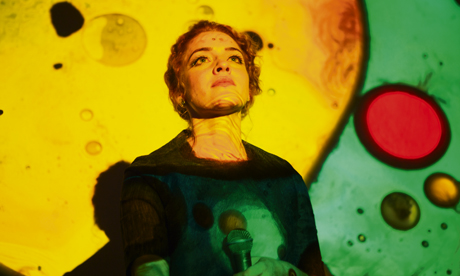Hackney Film Festival 2011 – review

Swedish singer Cornelia performs a live audio-visual set. Photograph: Fran Hales
The buzz of anticipation rising from the crowds of hundreds that spilled onto the pavement outside the Rio cinema in Dalston on a wet Saturday afternoon could mean only one thing: the Hackney Film Festival had returned.
The brainchild of Hackney-based director Steven McInerney, the festival debuted last year as a celebration of the wealth of creative talent that resides in the borough. For 2011, McInerney and his team ensured the festival stuck to its winning formula, while doubling its size to encompass a range of events and venues over four days, from 15 – 18 September.
Festivities kicked off on the Thursday with an informal roof-top gathering at the Platform Bar and Terrace at Netil House that had the intimate atmosphere of drinks round a friend’s living room, yet still boasted live audio-visual performances from local producer James Blanco and HFF-favourite Synthetics. Hotly-tipped Swedish singer Cornelia enthralled the crowd with her unique brand of alt-pop played out against a backdrop of swirling, psychedelic visuals.
It was followed on Friday by a series of collaborations between six visual and sound artists at Café OTO on Ashwin Street. Hackney’s best kept secret, its subdued ambience was reminiscent of an underground jazz club and served as the perfect venue for three pieces commissioned especially for the event.
Artists’ Lucy Parker and Tom White combined sepia-tinged slides and 16mm film clips with field recordings to create a haunting piece that evoked the beauty in the everyday, while Heather Phillipson’s Medico-Musico-Metaphysico was an ode to the receptive powers of the human ear, with live piano accompaniment from Matt Hammond. Along with Jenna Collins and Mark Peter Wright’s The Bollingbrook Sergeant they acted as a timely reminder that the festival is about far more than simply showcasing films.
“This year we really pushed the live aspect, concentrating on the cross over between cinema and performance,” McInerney explained. “We believe it plays a very important part in contemporary film and moving image.”
The focal point of the weekend was the festival’s return to the Rio on Saturday for two screenings of films connected with the borough. The variety and quality of work shown, which ranged from the supernatural shocks of Tor Kristoffersen’s Audrey and the deranged kid’s TV pastiche of THIS IS IT collective’s Don’t Hug Me I’m Scared ensured that both of the hour long screenings flew by leaving the crowd hungry for more.
Ansku, from Finland, has attended the festival in both years. “I always enjoy the short film screenings because you see such variation in a short space of time. The whole festival is really low key and relaxed and you feel like you can talk to anyone”.
Special mentions should go to Julia Pott’s Belly, a sublime lesson in heartfelt animation that dealt with the family ties between a bizarre assortment of surreal creatures that managed to be humorous, tragic and deeply human within its eight minute running time. In contrast, the visceral philosophising of Calum Macdiarmid’s Worship used stark psychological imagery to remind us that God can be found in the most unlikely of places.
Events were pushed in a more experimental direction in the evening with a selection of ‘live cinema’ pieces at the Arcola Tent on Ashwin Street. The makeshift venue resembled an endearingly ramshackle circus top, under which the audience was treated to a hypnotic display of live animation courtesy of Noriko Okaku and Max Hattler and later guided on an ethereal journey through the landscape of modern-day China by D-Fuse’s Latitude. Musician Si Begg and filmmaker Robin Mahoney produced the most surprises of the night with an audio-visual set that spliced cold war documentary footage and 80s infomercials over a soundtrack of rib-shaking bass.
Eager film fans were finally able to satiate their appetites on Sunday evening with a final screening on the Dalston Roof Park. Sheltered from the elements by an inflatable roof, the expertly compiled programme seemed to hint at a recurrent theme of the relationship between humans and the environment. Mike Wells’ Gold Dust provided a hard-hitting commentary on the darker side of the Olympic project punctuated by blasts of jazz saxophone, while Sculpture’s Olympic Sized Tantrum was a frenetic documentation of the stadium’s construction.
The event closed with director Emma Louise Williams’ introduction to her adaption of Michael Rosen’s performance poem Under The Cranes. Using archive and recent footage to examine the effect that Hackney’s landscape has on the memory and imagination its residents, it provided an apt summation of a festival that remains defiantly localised and community-based, while celebrating the creativity of the individual.
East London has no shortage of cultural events, but the Hackney Film Festival has managed to carve out its own niche in a crowded marketplace, undoubtedly fulfilling its self-prescribed remit to “create a rich film culture within Hackney by providing a platform for local filmmakers and audio-visual artists”. With rumours already circulating that next year’s events will include workshops for aspiring filmmakers, the festival’s organisers have cemented its place as an essential feature of the borough’s cultural calendar.
Related:
